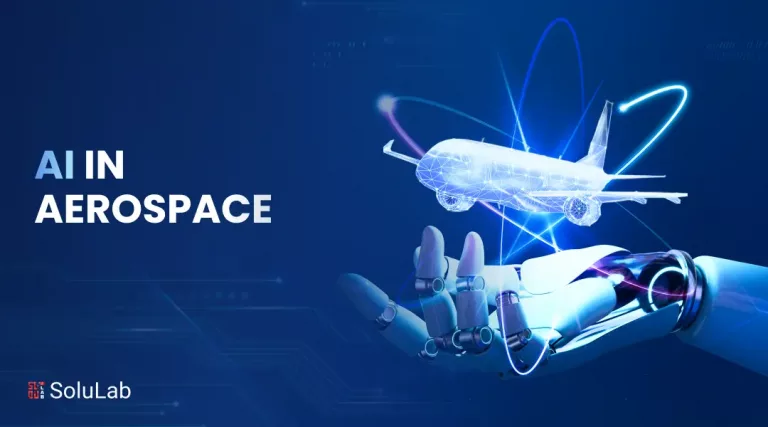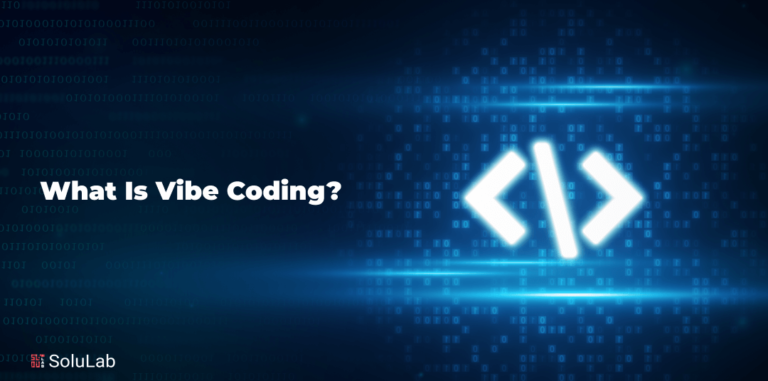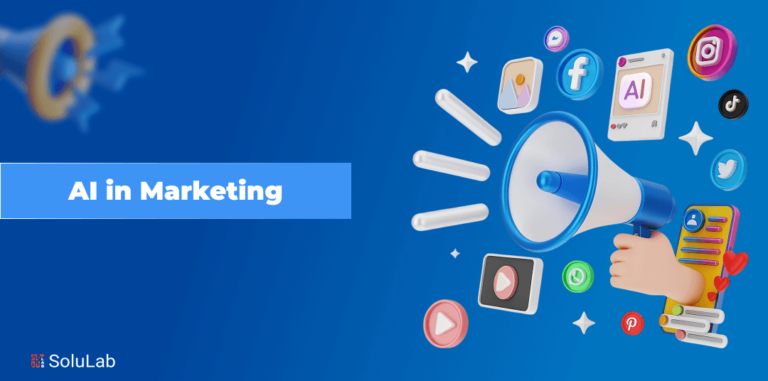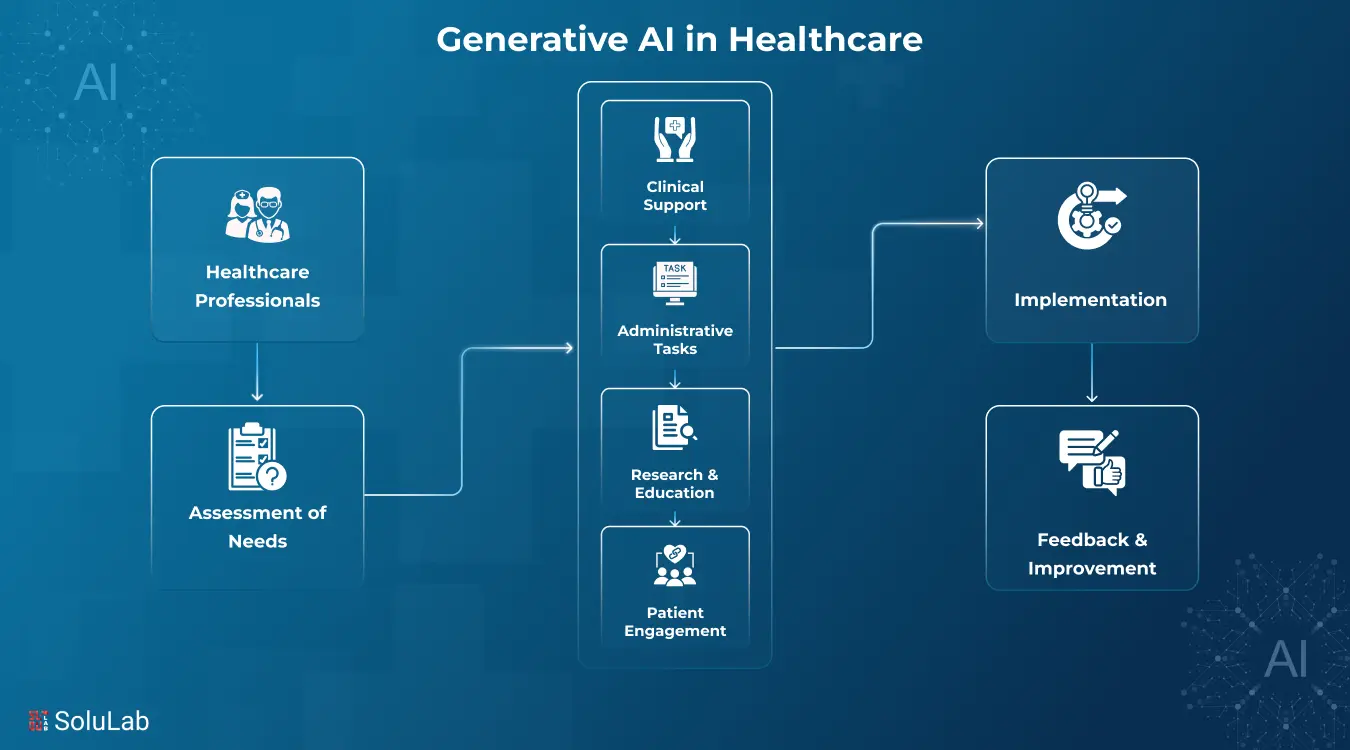
Generative AI technologies could ensure the long-term viability of healthcare organizations while reducing the labor expenditures that are inherent in this services-intensive sector. With the use of advanced algorithms and large volumes of data, AI systems can forecast results, produce new insights, and even develop answers to difficult medical problems.
Generative AI, for example, can help with personalized pharmaceutical regimens based on individual genetic profiles, forecasting the course of diseases, and optimizing treatment strategies for individuals with chronic disorders.
Although the majority of existing applications concentrate on automating and reducing costs in back-office activities, the ultimate objective is to enhance the experience of patients and healthcare providers. This blog will examine generative AI in healthcare, as well as its uses, advantages, and other important topics.
Healthcare Applications for Generative AI
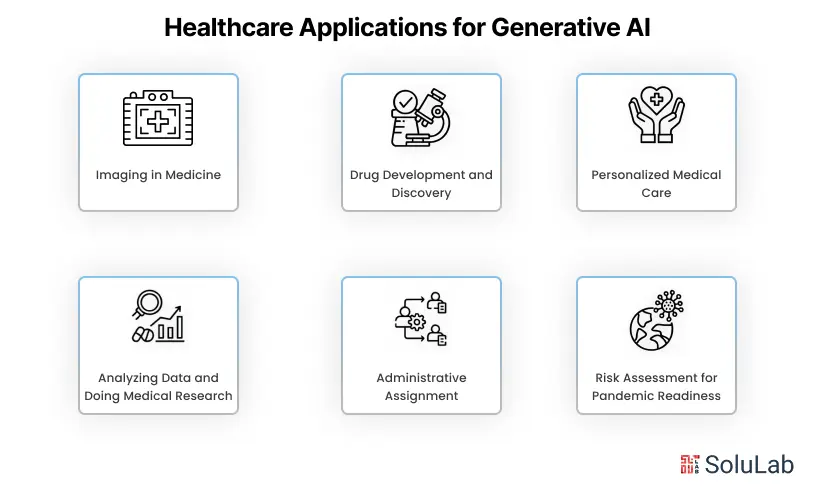
Generative AI has demonstrated considerable promise in a number of healthcare-related applications. Let’s examine each of these uses in more detail:
1. Imaging in Medicine
Convolutional neural networks (CNNs) and other deep learning frameworks are two famous examples of sophisticated approaches seen in advanced AI models, particularly in those intended for medical analysis. The following are some salient features of generative AI’s influence on medical imaging:
- Image Synthesis: Through the use of visually understandable representations, generative models create pictures of organs or tissues for educational objectives such as teaching medical practitioners and making medical conditions easier to explain to patients.
- Automated Segmentation: By using generative AI, medical picture analysis may be streamlined and time-saving for healthcare workers by automatically classifying organs or anomalies.
- Pathology Prediction: By utilizing Generative AI and healthcare to analyze patterns in medical pictures, it is possible to predict or diagnose pathological disorders. This allows for early identification and intervention, which leads to better patient outcomes.
2. Drug Development and Discovery
Drug development pipelines may become faster and more effective as a result of the potential for generative AI approaches to completely reimagine drug research and development. This is the application of generative AI in healthcare:
- Compound Generation: By effectively examining a wide range of chemical space, Generative AI models can help researchers find drugs more quickly. By suggesting new compounds with desirable features, these models optimize the search for possible drug candidates and speed up the process of identifying molecules that show promise for additional research and development.
- Drug-Drug Interactions: Generative AI and healthcare play a critical role in predicting possible drug interactions, helping researchers assess the efficacy and safety of mixing drugs. This skill is essential for the strategic planning of combination therapy, guaranteeing the best possible therapeutic results while reducing the hazards related to pharmacological interventions.
- Biomarker Discovery: Generative AI is essential for identifying biomarkers associated with disease, which allows patients to be categorized according to personal traits. This procedure improves the creation of customized treatments, resulting in more accurate and successful medical interventions catered to particular patient requirements.
- Clinical Trial Design: AI models make use of previous data from clinical trials to improve trial design, identify suitable patient populations, and foresee possible problems. This optimization greatly increases the effectiveness of drug development by improving the clinical trial’s strategic strategy.
- Predicting the Negative Effects of Drugs: Medical Artificial Intelligence models are a valuable tool for predicting and reducing the possibility of negative drug side effects. They also actively participate in the safety assessment of drug candidates during the development process. This proactive strategy improves the entire risk management process in drug development by facilitating the early detection and resolution of safety risks.
- Repurposing already-approved Pharmaceuticals: Generative AI is essential in this process because it can forecast the effectiveness of currently approved treatments against various ailments and suggest innovative uses for them. This presents opportunities for the expedited development of medicines for a range of medical disorders by utilizing the well-established safety profiles of repurposed medications to tackle a variety of health issues.
3. Personalized Medical Care
The goal of personalized medicine is to give individualized treatment recommendations based on patient data, and generative AI is essential to this effort. This is the application of generative AI in healthcare:
- Customized Treatment Regimens: Generative models are able to provide individualized treatment regimens by analyzing patient data, such as clinical data, genetic information, and medical history. This can help in determining which treatments will work best for each patient as well as forecasting their unique reaction.
- Predictive Analytics for Treatment Response and Illness Progression: By combining several patient characteristics and analyzing massive datasets, Generative AI may create predictive models that forecast treatment results and disease progression. This optimizes patient care by assisting medical practitioners in making well-informed decisions about treatment plans.
- Clinical Decision Assistance in real-time: GenAI in healthcare gives doctors evidence-based suggestions for individualized treatment plans based on a patient’s genetic profile in real-time. This expedites the decision-making process by quickly and precisely taking into account large volumes of data.
- Support for Ethical and Legal Compliance: GenAI in healthcare helps ensure that privacy laws and ethical standards are followed while negotiating ethical and legal issues around customized medicine. This preserves legal compliance with healthcare and fosters patient trust.
- Genetic Testing: Resource optimization is made possible by GenAI in healthcare, which improves genetic testing operations’ efficiency, streamlines workflows, and automates repetitive jobs. In order to overcome resource constraints and provide access to individualized medication, this is crucial.
- Pharmacogenomic Optimization: Using genetically-based medicine prescriptions, GenAI evaluates pharmacogenomic data to forecast individual medication responses. This reduces side effects and maximizes therapeutic results.
Read Blog: Top Generative AI Use Cases
4. Analyzing Data and Doing Medical Research
Data analysis and medical research provide a great deal of potential for generative AI approaches. These are some ways that generative AI and healthcare supports data analysis and medical research:
- Data Processing: Generative AI automates document inspections and data extraction while quickly analyzing large amounts of medical data. This is one of the key generative AI in healthcare use cases, as it streamlines administrative procedures and frees up researchers to concentrate more on important facets of their jobs.
- Medical Document Summarization: Generative AI is very good at providing scholars with brief summaries of long medical records. This facilitates understanding and decision-making more quickly, particularly while sifting through voluminous medical information, showcasing another vital generative AI healthcare use case.
- Analyzing and Identifying Trends: Generative AI examines patterns and trends in medical research by processing massive datasets. This keeps researchers up to date on the most recent advancements, encouraging a proactive and knowledgeable strategy in the sector, and highlighting generative AI in healthcare use cases
- Resource Optimization: By automating processes and making the most use of the resources at hand, generative AI helps medical research overcome its resource limitations. Projects with little funds or access to high-performance computer resources can especially benefit from this, making it a significant generative AI healthcare use case.
- Predictive Analytics Insights: Generative AI uses previous medical data to give insights into possible outcomes. This helps researchers plan and make decisions about their medical research initiatives, underlining the importance of generative AI in healthcare use cases.
5. Administrative Assignment
- Effective Administration of Appointments: Generative AI in healthcare examples include streamlining scheduling by automating reservations and rescheduling, guaranteeing patient-friendly timeslots, and improving overall scheduling effectiveness.
- Automated Record-keeping and Documentation: Generative AI frees healthcare workers from administrative duties by automating documentation chores like updating patient records and transcribing medical notes. This promotes more efficient record-keeping, showcasing Generative AI in healthcare examples
- Streamlined Billing and Claims Processing: Generative AI in healthcare examples features AI automating billing and claims processing, increasing financial workflows by decreasing mistakes, increasing accuracy, and speeding up the reimbursement cycle for healthcare providers.
- Automation of Data Entry and Extraction: GenAI reduces the amount of human data entering and improves the accuracy of healthcare databases by automating processes and extracting relevant information from a variety of sources, illustrating Generative AI in healthcare examples
- Efficient Communication Management: AI-powered chatbots, as part of Generative AI in healthcare examples, take care of standard questions, rescheduled appointments, and follow-ups, freeing up healthcare personnel to concentrate on more difficult jobs and enhancing communication.
- Automated Regulatory Compliance Checks: Generative AI promotes compliance with legal requirements by guaranteeing that administrative procedures comply with healthcare norms and regulations, as seen in various examples of Generative AI in healthcare.
- Optimization of Workflow Efficiency: Generative AI in healthcare examples include AI analyzing administrative workflows to find inefficiencies and making recommendations for improvements that result in more efficient and productive procedures, improving total workflow efficiency.
6. Risk Assessment for Pandemic Readiness
- Early Detection and Surveillance: To discover early indicators of developing infectious illnesses, GenAI examines real-time data from a variety of sources, including social media, health reports, and environmental data. Early warning systems are developed in part by the identification of anomalous patterns or clusters.
- Predictive Analytics to Epidemics: Artificial General Intelligence in healthcare analyzes population density, travel patterns, and environmental factors to anticipate probable hotspots for disease outbreaks by utilizing historical data and machine learning. This gives information on riskier places.
- Increasing the Efficiency of Vaccine Development: GenAI uses genetic data analysis and prediction to speed up medication research. This speeds up research and testing and helps us respond to new infections more quickly.
- Increasing the Robustness of the Supply Chain: Artificial General Intelligence in healthcare makes supply chain management better by anticipating and averting interruptions. It ensures a more resilient and adaptable supply chain for medications and medical equipment by analyzing global logistics, keeping an eye on inventory levels, and forecasting demand.
- Resource Allocation Optimization: In order to ensure the effective use of resources during a pandemic, GenAI examines data on labor distribution, equipment availability, and healthcare facility capacity in order to forecast epidemic trends and optimize resource allocation.
- Planning and Preparation for Numerous Scenarios: GenAI models several scenarios based on past data and present circumstances, assisting government agencies and healthcare institutions in making plans and getting ready for a range of possible outcomes. This makes it possible to respond to pandemics in a proactive and flexible manner.
These uses of Generative AI in revolutionizing healthcare show how it might advance medication development, customized treatment, diagnostics, and medical research. Healthcare practitioners may improve patient outcomes, optimize treatment tactics, and make better decisions by utilizing generative AI approaches.
How does Generative AI in Healthcare Work?
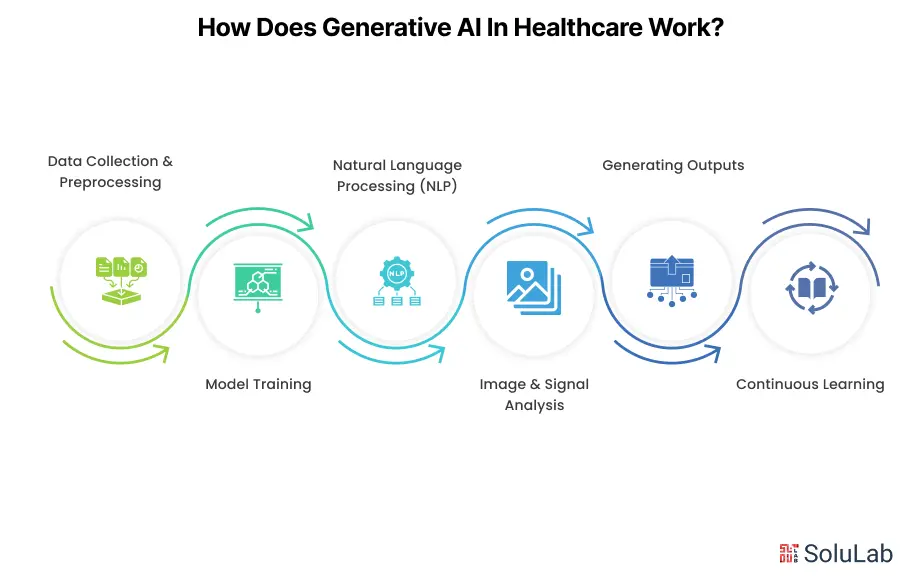
Generative AI integration into healthcare systems uses several elements to improve decision-making, produce insights, and expedite data processing. By incorporating effective Large Language Models (LLMs) and linking them to an organization’s specific knowledge base, it surpasses conventional healthcare techniques.
This architecture enables patients and healthcare professionals to make data-driven decisions instantly and contributes to the creation of new insights. Here’s how generative AI in healthcare works:
1. Data Collection & Preprocessing
Generative AI systems begin by collecting vast amounts of healthcare data, such as patient records, medical images, lab reports, and clinical notes. This data is cleaned, organized, and anonymized to ensure privacy and accuracy before being used to train AI models.
2. Model Training
The AI is trained on this data using machine learning algorithms, especially deep learning techniques. It learns patterns, relationships, and medical language from historical data, helping it understand how to replicate or predict outcomes in a clinical setting.
3. Natural Language Processing (NLP)
Generative AI uses NLP to understand and generate human-like text. In healthcare, this enables AI to write summaries, interpret clinical notes, and respond to patient queries, helping reduce doctors’ documentation workload.
4. Image & Signal Analysis
AI models can also analyze medical images (like X-rays or MRIs) and biosignals (like ECGs). Generative models help in reconstructing, enhancing, or predicting diagnostic images for faster and more accurate assessments.
5. Generating Outputs
Based on the input data, generative AI can create new, relevant content like treatment suggestions, discharge summaries, or even synthetic data for research, ensuring personalized and context-aware results.
6. Continuous Learning
Modern generative AI models can be updated with new data, helping them adapt to medical advancements, evolving guidelines, and rare case patterns, making them more effective over time.
Health Benefits of Generative AI
Generative AI has several advantages in the medical field, some of which are as follows:
1. Automating Normal and Repetitive Jobs: Data input, administrative procedures, and image analysis are just a few of the repetitive tasks that generative AI healthcare may automate in the healthcare industry. Healthcare personnel benefit from time savings from this automation, freeing them up to focus on more intricate and important areas of patient care.
2. Streamlined Processes and Efficient Use of Resources: By wisely assigning resources and setting priorities for tasks, generative AI may optimize healthcare operations. It can help with appointment scheduling, patient flow management, and care coordination, which can facilitate more seamless operations and effective use of available resources. Both cost savings and increased patient satisfaction may come from this.
3. Reducing Human Error and Bias: Diagnoses, treatment choices, and patient outcomes can all be impacted by human error and bias, which are ubiquitous in the healthcare industry. When trained and tested appropriately, generative AI healthcare models can reduce these inaccuracies by offering unbiased, consistent insight. They can guarantee more precise and objective diagnosis and prognosis while reducing the impact of human biases.
4. More Precise Prognoses and Diagnoses: Large amounts of patient data, like as genetic information, medical records, and environmental variables, may be analyzed using generative AI models. AI algorithms can find patterns and links in these data pieces that people would miss by combining and evaluating them. This may result in more precise forecasts of the course of the disease, individualized treatment programs, and early identification of possible hazards.
5. Training Scenarios and Virtual Simulations: For medical education, generative AI can provide realistic training scenarios and virtual simulations. By simulating a variety of medical situations and treatments, these simulators give medical practitioners a secure setting in which to hone their skills. It permits practical instruction without jeopardizing patient safety and offers chances for repeated practice and evaluation.
6. Access to a Wide Range of Case Studies and Professional Knowledge: Synthetic medical data, such as patient profiles and clinical situations, may be produced using generative AI. For teaching reasons, this synthetic data may be utilized to access a variety of case studies and uncommon illnesses. It helps medical personnel to broaden their knowledge, pick the brains of specialists, and gain proficiency in specific fields that could be scarce in actual patient interactions.
How to Implement Generative AI in Healthcare Industry?
The generative AI in healthcare market was valued at USD 1.95 billion in 2024 and is projected to reach USD 39.7 billion by 2034, growing at a CAGR of 35.17%.
A systematic methodology is necessary to ensure the successful adoption and use of generative AI in the healthcare sector. Here’s how to implement generative AI in healthcare businesses:
- Determine the Use Cases: Clearly outline the precise applications of generative AI in healthcare, such as drug development, medical image analysis, clinical documentation using natural language processing, predictive analytics, or customized medicine.
- Gathering and Preparing Data: Collect relevant and high-quality datasets to train generative AI models. Make sure the information is representative, varied, and complies with legal and privacy requirements. To improve the accuracy of model training, clean and preprocess the data.
- Choose a Suitable Generative Model: Based on the use cases that have been discovered, select the appropriate one. Generative Adversarial Networks (GANs), Variational Autoencoders (VAEs), and language models such as Generative Pre-trained Transformer (GPT) are examples of common designs.
- Get the Model Trained: Train the selected generative model using the prepared datasets. The task’s level of complexity will determine how much computing power is needed. Adjust the model to function at its best for the particular medical use case.
- Testing and Validation: Use different datasets that weren’t utilized for training to validate the generative model. To make sure the model satisfies the requirements for implementation in a healthcare setting, test its functionality, accuracy, and dependability.
- Connecting with Medical Systems: Connect the generative AI model to the workflows and systems used in healthcare today. Verify interoperability with Electronic Health Records (EHR) and other pertinent healthcare industry tools.
- Take Care of Regulatory Compliance: Respect healthcare legislation, such as the Health Insurance Portability and Accountability Act (HIPAA) in the US or comparable data protection statutes in other jurisdictions. Implement strong security measures to protect patient information.
- Continuous Improvement and Monitoring: Put in place systems for tracking the performance of the generative AI system on an ongoing basis. Update the model frequently with fresh data to increase accuracy and adjust to shifting healthcare environments.
- Concerns About Ethics and Openness: Address moral issues like prejudice in AI algorithms and make sure the application of generative AI in healthcare is transparent. Keep lines of communication open with patients and stakeholders regarding how AI is affecting healthcare procedures.
Conclusion
Global healthcare systems will include AI technologies even more as generative AI develops. Among other things, this includes developments in personalized medicine, virtual assistants, and medical image analysis. Leaders must evaluate every possible use case, weighing the benefits against any potential risks.
Specifically for generative AI, 82% of healthcare providers have implemented or intend to implement governance and oversight frameworks. They use generative AI to improve patient care and operations.
SoluLab, a generative AI development company, is backed by a team of AI professionals and technical experts who can render the best solutions for business needs. We’ve already helped forward-thinking organizations like Ambetter Health Insurance harness the power of AI to transform healthcare operations. By integrating advanced AI technologies, Ambetter achieved a 40% reduction in claims processing time, accelerating resolutions and significantly boosting customer satisfaction.
Whether you’re a healthcare provider, insurer, or tech-forward medical practice, we’re ready to help with Generative AI solutions tailored to your needs. Contact us today!
FAQs
1. What is Generative AI, and how is it used in healthcare?
Generative AI is one kind of machine learning that produces original text, images, videos, and music. It can also write code for developing software as well.
2. What are some examples of Generative AI applications in healthcare?
Generative AI has various applications in healthcare, including medical image generation, drug discovery, patient data analysis, disease prediction, and virtual patient simulation.
3. Which is the best AI for healthcare?
One of the best AI tools for healthcare that can identify diabetic retinopathy is IDx-DR. Without human assistance, IDx-DR examines retinal images taken by a particular camera and produces data quickly.
4. How will AI improve medical care?
Enhancing patient results using predictive analysis, for instance, AI is capable of analyzing big datasets to find trends and risk factors related to illness. By doing this, it aids medical professionals in determining the probability of how people would contract illness.
5. How can SoluLab assist with Generative AI development for healthcare?
SoluLab is a leading Generative AI development company with expertise in creating innovative solutions for the healthcare industry. Our Generative AI developers specialize in developing tailored solutions to address specific healthcare challenges, such as medical image generation, predictive analytics, and personalized treatment planning.
6. How can healthcare organizations get started with incorporating Generative AI into their operations?
Healthcare organizations interested in leveraging Generative AI can start by identifying specific use cases that align with their goals and challenges. Partnering with a reputable Generative AI development company like SoluLab can provide guidance and expertise throughout the implementation process, from initial planning to deployment and beyond.




